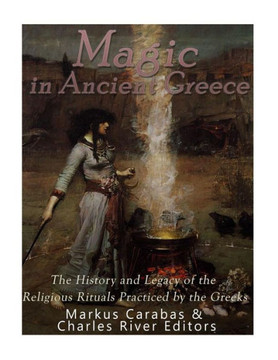
Createspace Independent Publishing Platform
Roman Greece : The History And Legacy Of Ancient Rome'S Conquest Of Greece And Assimilation Of Greek Culture
Product Code:
9781984036797
ISBN13:
9781984036797
Condition:
New
$11.51

Roman Greece : The History And Legacy Of Ancient Rome'S Conquest Of Greece And Assimilation Of Greek Culture
$11.51
*Includes pictures *Includes online resources and a bibliography for further reading "Graecia capta ferum victorem cepit" ("Conquered Greece captured her uncouth conqueror and brought her arts to Latium") - Horace Graeco-Roman relations in the ancient world are normally assumed to date, essentially, from 146 B.C., when Rome organized its supervision of Greece through its Governors in Macedonia. In fact, the first direct interactions of any note between the two come about during the first Illyrian War in 229 B.C, although, of course there had been contacts of numerous kinds even prior to this date. Phillip V of Macedon had allied himself with Hannibal and that, in itself, guaranteed, at some point, that the Romans would turn their full attention to the eastern Mediterranean area, if for no other reason than to settle that outstanding score once and for all. Phillip was defeated in 197 B.C. at the Battle of Cynoscephalae and his son Perseus, at Pydna in 168 B.C. Following these defeats, Macedonia was divided into four republics under Roman governorship, but the rest of Greece was left relatively free from direct Roman rule. In due course, opposition to Rome's increasing domination of the region led to the establishment of the Achaean League, comprising a number of city states, headed by Corinth, to oppose the Romans. As this suggests, in the early years of the Principate despite growing Philhellenism in the Empire, the vast majority of Greeks, with the notable exception of Sparta, were very unwilling subjects of Rome. There was unrest in the Augustan period (27 B.C. - AD 14), particularly in Athens, and the imperial cult made little or no headway until the time of Nero (AD54 - 68), who, along with Hadrian much later (AD117 - 138), took a special interest in Greece and all things Greek. Nero, for example began the work on the Corinth canal, using slave labour, of course, and Hadrian completed a number of projects that are dealt with later in some detail. The antagonism that the majority of Greeks felt towards Rome was not helped by Caesar's foundation of a Roman colony at Corinth in 44 B.C. and another by Augustus at Nicopolis in 31 B.C. In both cases the establishment of the colonies had led to the forcible removal of the indigenous populations to make room for the colonists. What was, however, even more resented was what the Greeks considered to be the pillage of their culture and heritage. Various emperors systematically looted Greek temples and public buildings of their sculptures and other priceless works of art, taking them back to adorn the homes of the rich or public buildings in Rome. The pillage of Greek heritage extended to attempts to absorb Greek cults and Suetonius records the ultimately failed attempt to transfer the whole Eleusinian mystery cult to Rome. However, despite the ravages wrought on the Greek cities and their populations by Roman rule, in the end the Hellenism that came to be such a feature of the Roman Empire actually did more to secure the continuation of Greek culture and heritage than anything the Greeks themselves could have done. It can be argued that Roman culture was, indeed, Graeco-Roman rather than Roman. It was the Greek language that served as the lingua franca in the Eastern Empire and much of the west including Italy. Many Greek intellectuals, including Galen, were based in Rome and the Roman aristocracy more and more came to embrace Greek literature and philosophy. Homer's epics inspired Virgil's Aeneid and Seneca wrote in Greek. Earlier, Scipio Africanus (236 - 183 B.C.), the epitome of the Roman martial hero, studied Greek philosophy and regarded Greek culture as the benchmark against which all others had to be judged. The Roman poet and philosopher Horace studied in Athens during the Principate and, in common with many of his class, saw that city as the intellectual centre of the world.
| Author: Charles River Charles River Editors |
| Publisher: Createspace Independent Publishing Platform |
| Publication Date: Jan 20, 2018 |
| Number of Pages: 84 pages |
| Language: English |
| Binding: Paperback |
| ISBN-10: 1984036793 |
| ISBN-13: 9781984036797 |




